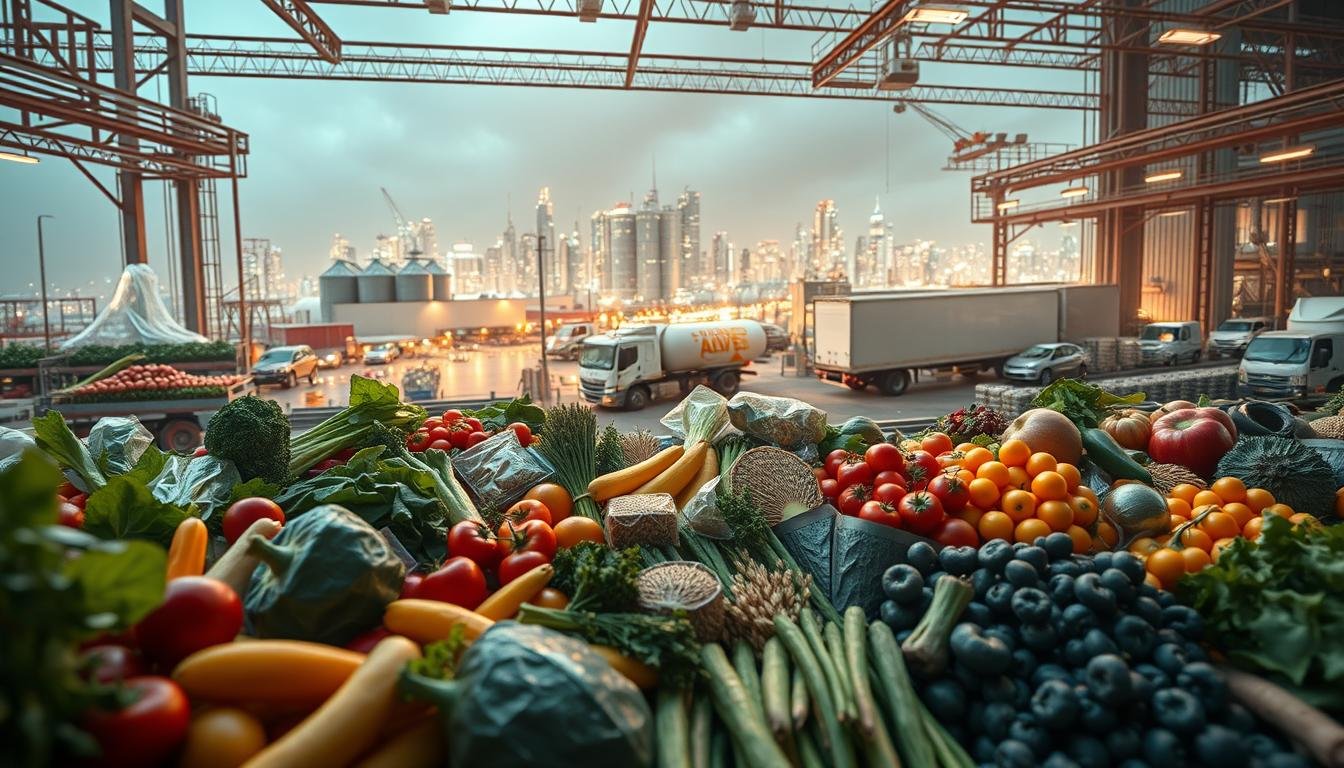Food Tech Crypto: The Tasty Future of Dining – The dining industry is undergoing a remarkable transformation, driven by innovative technologies. Blockchain, in particular, is reshaping how we track and trust what we consume. By enabling traceability from farm to table, this technology ensures transparency and security in the supply chain.
Companies like Walmart and Maersk are leading the charge. Walmart’s blockchain initiative tracks products in real-time, while Maersk’s TradeLens enhances global trade efficiency. These efforts highlight how datum stored in a decentralized system can build consumer confidence and streamline operations.
This integration of advanced tools is not just a trend—it’s a necessity. As the chain becomes more complex, the need for reliable traceability grows. The result? A dining experience that’s safer, more transparent, and deeply connected to its origins.
Key Takeaways
- Blockchain ensures traceability in the supply chain.
- Walmart and Maersk are pioneers in this space.
- Decentralized systems enhance transparency and security.
- Consumer trust grows with auditable data.
- Technology integration is essential for modern dining.
Understanding the Food Tech Crypto Revolution
Blockchain is reshaping the way we track and verify the journey of products from origin to consumer. This innovation, often referred to as “Food Tech Crypto,” combines advanced systems with decentralized networks to ensure transparency and security in supply chains. Its importance lies in its ability to address critical challenges like traceability, safety, and operational efficiency.
100X Coints? – Your Ticket to Becoming a Crypto Millionaire! Click here to learn more
Defining Food Tech Crypto and Its Importance
Food Tech Crypto refers to the integration of blockchain technology into supply chain management. It ensures that every step of a product’s journey is recorded and verifiable. This approach is crucial for maintaining quality and safety, as it allows companies to track products in real-time and respond quickly to issues.
For example, Walmart partnered with IBM to implement a blockchain-based solution. This system reduced the time needed to trace products from days to seconds. Such advancements highlight how technology can enhance trust and reliability in the industry.
How Blockchain is Reshaping Food Supply Chains
Blockchain technology provides a secure and efficient way to manage transactions and data. It creates an immutable record of every step in the supply chain, from production to delivery. This ensures that information is accurate and accessible to all stakeholders.
Companies benefit from improved operational efficiency and reduced costs. For instance, blockchain solutions eliminate the need for intermediaries, speeding up processes and minimizing errors. This technology also plays a vital role in combating fraud and ensuring compliance with regulations.
| Benefit | Description |
|---|---|
| Traceability | Track products from origin to consumer in real-time. |
| Transparency | Provide clear and accessible information to all parties. |
| Efficiency | Streamline processes and reduce operational costs. |
| Security | Ensure data integrity and prevent fraud. |
By leveraging blockchain technology, companies can build consumer trust and deliver higher-quality products. This transformation is not just a trend—it’s a necessity for modern supply chains.
Blockchain and Food Supply Chain Traceability
The integration of blockchain technology is revolutionizing supply chain transparency. By creating an immutable ledger, it ensures every step of the process is verifiable and secure. This innovation is transforming how industries manage their operations, from production to delivery.

From Farm to Table: The Role of Blockchain in Traceability
Blockchain provides end-to-end traceability, tracking products from their origin to the consumer’s table. This transparency builds trust within the industry and ensures accountability. For example, Walmart’s blockchain system can trace mangoes in just 2.2 seconds, showcasing its efficiency.
Case Studies: Walmart, Maersk, and More
Walmart and Maersk are pioneers in leveraging blockchain for supply chain management. Walmart’s partnership with IBM has streamlined traceability, while Maersk’s TradeLens platform enhances global trade efficiency. These initiatives highlight how blockchain improves operational accuracy and reduces costs.
Ensuring Food Safety and Quality Through Technology
Blockchain enhances safety and quality by improving recall efficiency. Its decentralized network allows providers to pinpoint issues quickly, minimizing risks. This technology sets new standards in the industry, ensuring safer and more reliable distribution systems.
Innovative Trends in Food Technology and Dining
The latest advancements in technology are reshaping how we interact with the dining experience. From real-time monitoring to mobile traceability systems, these innovations are setting new standards for transparency and trust. By integrating blockchain into dining, companies are ensuring that every step of the process is verifiable and secure.
Emerging Technologies Integrating Food and Blockchain
Blockchain-based technologies are redefining how we track and trust the products we consume. QR codes, for instance, allow consumers to scan and access detailed information about a product’s origin and journey. This level of transparency builds consumer confidence and ensures product assurance.
Real-time monitoring systems are another breakthrough. These tools enable retailers to track products throughout the supply chain, reducing delays and improving efficiency. For example, live analytics provide precise date and time data on processing and delivery, ensuring accuracy and reliability.
Enhancing Transparency and Trust in the Food Industry
Retailers are leveraging blockchain data to optimize supply chain management. By eliminating intermediaries, they can streamline operations and reduce costs. This approach also enhances consumer trust, as every product’s origin is verifiable and auditable.
Advanced applications are addressing quality control and compliance standards. For instance, blockchain systems can quickly identify and resolve issues, minimizing risks and ensuring safety. These innovations are transforming the industry, making it more transparent and efficient.
| Technology | Benefit |
|---|---|
| QR Codes | Provide detailed product information for consumers. |
| Real-Time Monitoring | Track products and reduce processing delays. |
| Blockchain Data | Enhance supply chain efficiency and transparency. |
| Live Analytics | Offer precise date and time data for accuracy. |
These technological trends are not just innovations—they are essential tools for modern dining. By prioritizing transparency and trust, they are shaping a safer and more reliable future for the industry.
Overcoming Challenges and Embracing Opportunities in Food Supply Chains
The food supply chain faces significant challenges, but blockchain offers innovative solutions to overcome them. From ensuring product provenance to enhancing chain management, this technology is transforming how we address long-standing issues.

Addressing Food Fraud and Traceability Challenges
One of the most pressing issues in the supply chain is food fraud. Verifying the origin of products across the entire chain has traditionally been difficult. Blockchain projects are mitigating these challenges by securely recording every transaction.
For example, Walmart collaborated with Tsinghua University to trace pork in China. This initiative ensures that every step of the process is transparent and verifiable. Such efforts highlight how blockchain can build trust and reduce fraud.
Cost, Compliance, and the Future of Supply Chain Management
Implementing blockchain solutions comes with its own set of challenges, including cost and compliance. Companies must navigate regulatory requirements while investing in new technologies. However, the long-term benefits often outweigh the initial costs.
Leading suppliers are using blockchain to ensure honest and reliable source verification. This approach not only enhances chain management but also creates opportunities for future innovation. By overcoming these challenges, companies can transform their supply systems from reactive recalls to proactive management.
Conclusion
The future of supply chain management is being redefined by blockchain’s transformative power. Its application in ensuring traceability and security has revolutionized how products are tracked and managed. Companies like Walmart and Maersk have demonstrated the immense potential of this technology in enhancing transparency and efficiency.
As businesses continue to adopt blockchain, the focus will shift to overcoming future challenges. Reliable and secure applications must roll out across food supply chains to ensure compliance and trust. This innovation not only benefits suppliers and retailers but also empowers consumers with verifiable product information.
Continuous innovation will drive improved safety and efficiency in the industry. By integrating blockchain solutions, the supply chain becomes more transparent, secure, and resilient. The journey has just begun, and the possibilities are endless.


